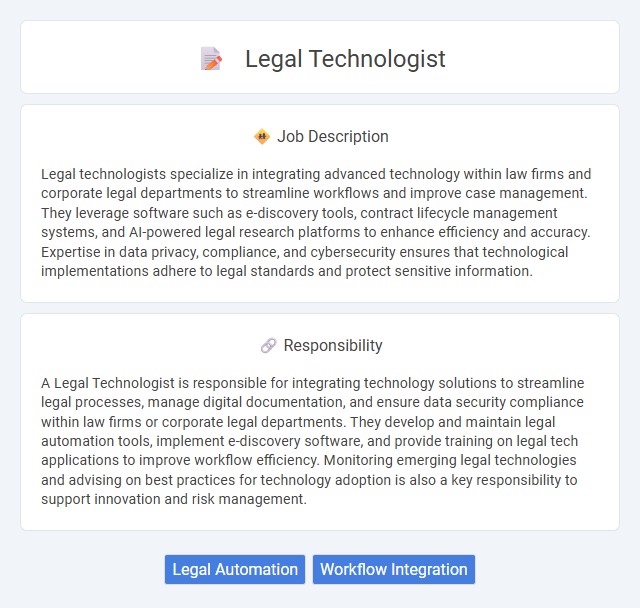
Legal technologists specialize in integrating advanced technology within law firms and corporate legal departments to streamline workflows and improve case management. They leverage software such as e-discovery tools, contract lifecycle management systems, and AI-powered legal research platforms to enhance efficiency and accuracy. Expertise in data privacy, compliance, and cybersecurity ensures that technological implementations adhere to legal standards and protect sensitive information.
People with strong analytical skills and a keen interest in both law and technology are probably well-suited for a legal technologist job. Individuals who adapt quickly to new software, enjoy problem-solving, and possess effective communication skills may find this role rewarding and engaging. Those lacking technical proficiency or unfamiliar with legal frameworks might face challenges in excelling within this position.
Qualification
A Legal Technologist typically requires a blend of legal expertise and technical proficiency, often holding a degree in law combined with certifications in data analytics, programming, or legal technology platforms. Proficiency in technologies such as AI-driven document review tools, blockchain, and e-discovery software is critical for optimizing legal processes. Strong analytical skills, familiarity with regulatory compliance, and continuous learning in emerging fintech tools enhance a Legal Technologist's effectiveness in transforming legal services.
Responsibility
A Legal Technologist is responsible for integrating technology solutions to streamline legal processes, manage digital documentation, and ensure data security compliance within law firms or corporate legal departments. They develop and maintain legal automation tools, implement e-discovery software, and provide training on legal tech applications to improve workflow efficiency. Monitoring emerging legal technologies and advising on best practices for technology adoption is also a key responsibility to support innovation and risk management.
Benefit
Legal technologists probably enhance law firms' efficiency by automating routine tasks and improving document management. This role likely reduces human error while enabling faster case analysis through advanced software tools. Organizations may see cost savings and improved client satisfaction as a result of streamlined legal operations.
Challenge
Legal technologists likely face the challenge of integrating rapidly evolving technologies with existing legal frameworks. They probably need to address complex issues related to data privacy, cybersecurity, and compliance while ensuring legal accuracy. Adapting to continuous changes in both technology and regulations might require strong problem-solving skills and flexibility.
Career Advancement
Legal technologists leverage expertise in law and technology to streamline legal processes and improve efficiency in law firms and corporate legal departments. Career advancement in this field often involves progressing to roles such as Legal Technology Manager, Chief Legal Technology Officer, or Director of Legal Operations, where strategic decision-making and innovation drive organizational growth. Gaining certifications in legal tech tools and project management enhances opportunities for leadership positions and consulting roles.
Key Terms
Legal Automation
Legal technologists specializing in legal automation leverage advanced software and artificial intelligence to streamline contract management, compliance tracking, and document review processes. Expertise in robotic process automation (RPA) and AI-driven analytics enables reduction of manual legal tasks, increasing efficiency and accuracy in law firms and corporate legal departments. Mastery of platforms like ContractExpress, Kira Systems, and ROSS Intelligence is essential for implementing scalable automated solutions that enhance legal workflows.
Workflow Integration
Legal technologists specializing in workflow integration streamline legal processes by implementing automated systems that enhance document management, contract lifecycle, and case tracking. They leverage tools such as AI-driven contract analysis and cloud-based collaboration platforms to reduce manual tasks and improve efficiency in law firms and corporate legal departments. Expertise in integrating software solutions like CLM (Contract Lifecycle Management) and e-discovery platforms ensures seamless data flow, compliance, and faster turnaround times.
 kuljobs.com
kuljobs.com